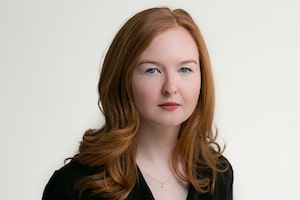
Defence lawyer Boris Bytensky, clockwise from top left, father of the accused Vahe Minassian, Justice Anne Molloy, and defendant Alek Minassian are shown during a murder trial conducted via Zoom videoconference, in this courtroom sketch on Nov. 16, 2020.Alexandra Newbould/The Canadian Press
The father of a man accused of killing 10 people in the Toronto van attack faced pushback during cross-examination at his son’s murder trial Tuesday, with the prosecution suggesting that he has tailored his evidence to help his son’s defence.
Alek Minassian is on trial for 10 counts of first-degree murder and 16 counts of attempted murder in connection with the April 23, 2018, mass killing, in which he intentionally drove a rental van down the sidewalk of Toronto’s busy Yonge Street for several city blocks, through hordes of screaming pedestrians.
The 28-year-old has autism spectrum disorder, which his lawyer Boris Bytensky argues made him unable to understand on a rational level that what he was doing was wrong. As a result, the question for Superior Court Justice Anne Molloy at this trial is not whether Mr. Minassian planned and carried out the mass killing, but whether he can be held criminally responsible for it.
On Monday, Vahe Minassian described his son as a socially awkward but “gentle" person, whom he hadn’t seen angry since he was a small child.
During cross-examination Tuesday, assistant Crown attorney Cynthia Valarezo suggested Mr. Minassian was overemphasizing his son’s “social inabilities and deficiencies” to help him meet the criteria to be found not criminally responsible.
For example, she took issue with the father’s characterization of his son’s demeanour – particularly during his interrogation by police, after his arrest (a video of which has been played at trial). Originally, Mr. Minassian told doctors involved in the case that he saw his son leaning over, crying, during the video. But he later changed his mind, saying that upon closer look, it appeared his son was talking under his breath.
“You’re aware that Alek’s inability to show emotions is incredibly important at this trial,” Ms. Valarezo argued. But Mr. Minassian insisted his evidence is not based on anything other than what he knows about his son.
Ms. Valarezo also took issue with skepticism expressed by Mr. Minassian, around some of the things his son said during his police interview and psychiatric assessments.
For example, Mr. Minassian said he finds it hard to believe that his son was indeed rejected by women at a Halloween party in 2013, as he described to police – an encounter that allegedly fuelled his anger toward woman and his allegiance to the toxic “incel” subculture.
Mr. Minassian argued his son would barely look at women. Rather, he believes his son was echoing information he read in a manifesto by a mass murderer in the United States considered to be the forefather of the incel movement.
Ms. Valarezo argued that perhaps Mr. Minassian did not know his son as well as he thought. For example, while he had testified that his son was "upbeat” in the days leading up to the attack, Ms. Valarezo noted the younger Mr. Minassian told his assessors he’d been feeling lonely and had “extreme anxiety” about starting a new job.
“He hadn’t told me that,” his father conceded – although he similarly questioned whether this was true.
Ms. Valarezo then asked Mr. Minassian about the shock he had recalled feeling when he learned that his son attempted to bait a police officer into shooting him after the attack. “Did you know that Alek had told [one of the doctors] that during his high-school years, on occasion he had thoughts of suicide?”
“No I wasn’t aware of that,” his father said.
“You had no idea that in high school, Alek was interested in mass murderers and sometimes fantasized about becoming a mass shooter?” she asked.
“No I didn’t,” he said.
“It is clear that when he sets his mind to it,” she suggested, “Alek has the ability to keep important information from you.”
The trial will resume Wednesday afternoon.
Our Morning Update and Evening Update newsletters are written by Globe editors, giving you a concise summary of the day’s most important headlines. Sign up today.
 Molly Hayes
Molly Hayes